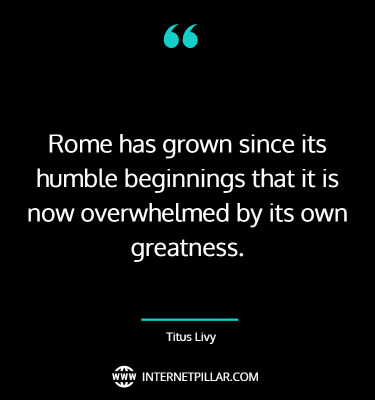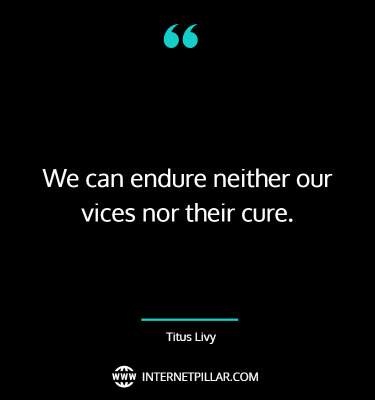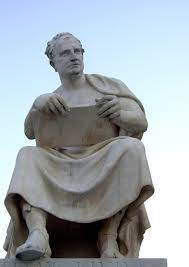Titus Livius also known as Livy was one of the three significant Roman historians whose work had a profound impact on the style and philosophy of historical writing up to the 18th century.
Born in Patavium (now Padua, Italy) around 59/64 BC and died in AD 17, Livy penned the history of Rome, which became a classic during his lifetime.
Unlike many of his contemporaries, Livy was not involved in politics. Instead, he viewed history from a personal and moral perspective, focusing on character rather than partisan politics.

He underlined the moral decline of Rome and his profound preoccupation with character informed his historical writing. Livy’s writing style was versatile and rich, varying from long, detailed descriptions to terse, abrupt sentences.
His work influenced later historians and set new standards for literary style.
The essence of Livy’s work lies in his exploration of history through character and his deep commitment to moral seriousness.
Here are some of the quotes from Titus Livy to make you think.
Top 10 Titus Livy Quotes

“A fraudulent intent, however carefully concealed at the outset, will generally, in the end, betray itself.” ~ (Titus Livy).

“It takes a long time to bring excellence to maturity.” ~ (Titus Livy).

“Envy is blind. -Caeca invidia est.” ~ (Titus Livy).

“Never is work without reward, or reward without work.” ~ (Titus Livy).

“It is when fortune is the most propitious that she is least to be trusted.” ~ (Titus Livy).

“There is nothing that is more often clothed in an attractive garb than a false creed.” ~ (Titus Livy).

“Woe to the conquered.” ~ (Titus Livy).

“Rome has grown since its humble beginnings that it is now overwhelmed by its own greatness.” ~ (Titus Livy).

“No law is sufficiently convenient to all.” ~ (Titus Livy).

“Greater is our terror of the unknown.” ~ (Titus Livy).
Best Titus Livy Quotes

“From abundance springs satiety.” ~ (Titus Livy).

“It is better that a guilty man should not be brought to trial than that he should be acquitted.” ~ (Titus Livy).

“An honor prudently declined often returns with increased luster.” ~ (Titus Livy).

“The best known evil is the most tolerable.” ~ (Titus Livy).

“The study of History is the best medicine for a sick mind.” ~ (Titus Livy).

“The populace is like the sea motionless in itself, but stirred by every wind, even the lightest breeze.” ~ (Titus Livy).

“We survive on adversity and perish in ease and comfort.” ~ (Titus Livy).
“Truth is often eclipsed but never extinguished.” ~ (Titus Livy).

“Persevere in virtue and diligence.” ~ (Titus Livy).
“Luck rules every human endeavor, especially war.” ~ (Titus Livy).
“Men are only clever at shifting blame from their own shoulders to those of others.” ~ (Titus Livy).

“There is nothing man will not attempt when great enterprises hold out the promise of great rewards.” ~ (Titus Livy).
“A person under the firm persuasion that he can command resources virtually has them.” ~ (Titus Livy).
Powerful Titus Livy Quotes
“Treachery, though at first very cautious, in the end betrays itself.” ~ (Titus Livy).

“Shared danger is the strongest of bonds; it will keep men united in spite of mutual dislike and suspicion.” ~ (Titus Livy).
“Events of great consequence often spring from trifling circumstances.” ~ (Titus Livy).
“Many difficulties which nature throws in our way, may be smoothed away by the exercise of intelligence.” ~ (Titus Livy).

“No wickedness proceeds on any grounds of reason.” ~ (Titus Livy).
“Luck is of little moment to the great general, for it is under the control of his intellect and his judgment.” ~ (Titus Livy).
“Such is the nature of crowds: either they are humble and servile or arrogant and dominating. They are incapable of making moderate use of freedom, which is the middle course, or of keeping it.” ~ (Titus Livy).
“Resistance to criminal rashness comes better late than never.” ~ (Titus Livy).

“Nothing moves more quickly than scandal.” ~ (Titus Livy).
“Bad beginnings, bad endings.” ~ (Titus Livy).
“You know how to vanquish, Hannibal, but you do not know how to profit from victory.” ~ (Titus Livy).
“The mind sins, not the body; if there is no intention, there is no blame.” ~ (Titus Livy).

“Envy like fire always makes for the highest points.” ~ (Titus Livy).
“He is truly a man who will not permit himself to be unduly elated when fortune’s breeze is favorable, or cast down when it is adverse.” ~ (Titus Livy).
“Good fortune and a good disposition are rarely given to the same man.” ~ (Titus Livy).
“No crime can ever be defended on rational grounds.” ~ (Titus Livy).
Famous Titus Livy Quotes

“Many things complicated by nature are restored by reason.” ~ (Titus Livy).
“Avarice and luxury, those evils which have been the ruin of every great state.” ~ (Titus Livy).
“In grave difficulties, and with little hope, the boldest measures are the safest.” ~ (Titus Livy).
“When Tarquin the Proud was asked what was the best mode of governing a conquered city, he replied only by beating down with his staff all the tallest poppies in his garden.” ~ (Titus Livy).

“We can endure neither our vices nor their cure.” ~ (Titus Livy).
“There is an old saying which, from its truth, has become proverbial, that friendships should be immortal, enmities mortal.” ~ (Titus Livy).
“Men are slower to recognize blessings than evils.” ~ (Titus Livy).
“Those ills are easiest to bear with which we are most familiar.” ~ (Titus Livy).
“Certain peace is better and safer than anticipated victory.” ~ (Titus Livy).
“Passions are generally roused from great conflict.” ~ (Titus Livy).
“No man likes to be surpassed by those of this own level.” ~ (Titus Livy).
“Temerity is not always successful.” ~ (Titus Livy).

“He will have true glory who despises it.” ~ (Titus Livy).
“By flying, men often rush into the midst of calamities.” ~ (Titus Livy).
“No law is quite appropriate for all.” ~ (Titus Livy).
“No one wants to be excelled by his relatives.” ~ (Titus Livy).
“Prosperity engenders sloth.” ~ (Titus Livy).
“Men are least safe from what success induces them not to fear.” ~ (Titus Livy).
Wise Titus Livy Quotes
“Once let good faith be abandoned, and all social existence would perish.” ~ (Titus Livy).

“Valor is the soldier’s adornment.” ~ (Titus Livy).
“I have often heard that the outstanding man is he who thinks deeply about a problem, and the next is he who listens carefully to advice.” ~ (Titus Livy).
“Toil and pleasure, dissimilar in nature, are nevertheless united by a certain natural bond.” ~ (Titus Livy).
“Nowhere are our calculations more frequently upset than in war.” ~ (Titus Livy).
“Friends should be judged by their acts, not their words.” ~ (Titus Livy).

“Great contests generally excite great animosities.” ~ (Titus Livy).
“Law is a thing which is insensible, and inexorable, more beneficial and more propitious to the weak than to the strong; it admits of no mitigation nor pardon, once you have overstepped its limits.” ~ (Titus Livy).
“Toil and pleasure, in their natures opposite, are yet linked together in a kind of necessary connection.” ~ (Titus Livy).
“Adversity makes men remember God.” ~ (Titus Livy).
“This above all makes history useful and desirable; it unfolds before our eyes a glorious record of exemplary actions.” ~ (Titus Livy).
“The real power behind whatever success I have now was something I found within myself – something that’s in all of us, I think, a little piece of God just waiting to be discovered.” ~ (Titus Livy).
“The sun has not yet set for all time.” ~ (Titus Livy).

“War is just to those to whom war is necessary.” ~ (Titus Livy).
“No law can possibly meet the convenience of every one: we must be satisfied if it be beneficial on the whole and to the majority.” ~ (Titus Livy).
“Haste is blind and improvident.” ~ (Titus Livy).
Popular Titus Livy Quotes
“Friendships ought to be immortal, hostilities mortal.” ~ (Titus Livy).

“The less there is of fear, the less there is of danger.” ~ (Titus Livy).
“Necessity is the last and strongest weapon.” ~ (Titus Livy).
“That business does not prosper which you transact with the eyes of others.” ~ (Titus Livy).
“Nothing is so uncertain or unpredictable as the feelings of a crowd.” ~ (Titus Livy).
“Wit is the flower of the imagination.” ~ (Titus Livy).
“Envy is blind, and is only clever in depreciating the virtues of others.” ~ (Titus Livy).

“The worst kind of shame is being ashamed of frugality or poverty.” ~ (Titus Livy).
“It is easier to criticize than to correct our past errors.” ~ (Titus Livy).
“It is easy at any moment to resign the possession of a great fortune; to acquire it is difficult and arduous.” ~ (Titus Livy).
“Fame opportunely despised often comes back redoubled.” ~ (Titus Livy).
“All things will be clear and distinct to the man who does not hurry; haste is blind and improvident.” ~ (Titus Livy).
“The name of freedom regained is sweet to hear.” ~ (Titus Livy).
“A gentleman is mindful no less of the freedom of others than of his own dignity.” ~ (Titus Livy).
Thought-Provoking Titus Livy Quotes
“The old Romans all wished to have a king over them because they had not yet tasted the sweetness of freedom.” ~ (Titus Livy).
“Men’s minds are too ready to excuse guilt in themselves.” ~ (Titus Livy).
“The result showed that fortune helps the brave.” ~ (Titus Livy).
“In adversity assume the countenance of prosperity, and in prosperity moderate the temper and desires.” ~ (Titus Livy).
“Men are seldom blessed with good fortune and good sense at the same time.” ~ (Titus Livy).

“Favor and honor sometimes fall more fitly on those who do not desire them.” ~ (Titus Livy).
“Nature has ordained that the man who is pleading his own cause before a large audience, will be more readily listened to than he who has no object in view other than the public benefit.” ~ (Titus Livy).
“A woman’s mind is affected by the meanest gifts.” ~ (Titus Livy).
“There are laws for peace as well as war.” ~ (Titus Livy).
“Fortune blinds men when she does not wish them to withstand the violence of her onslaughts.” ~ (Titus Livy).
“Present sufferings seem far greater to men than those they merely dread.” ~ (Titus Livy).
“Truth, they say, is but too often in difficulties, but is never finally suppressed.” ~ (Titus Livy).
“Nothing stings us so bitterly as the loss of money.” ~ (Titus Livy).
“Dignity is a matter which concerns only mankind.” ~ (Titus Livy).
“We feel public misfortunes just so far as they affect our private circumstances, and nothing of this nature appeals more directly to us than the loss of money.” ~ (Titus Livy).

“There is always more spirit in attack than in defence.” ~ (Titus Livy).
“False shame only is harmful.” ~ (Titus Livy).
“Envy, like flames, soars upwards.” ~ (Titus Livy).
“The troubles which have come upon us always seem more serious than those which are only threatening.” ~ (Titus Livy).
“Better and safer is an assured peace than a victory hoped for. The one is in your own power, the other is in the hands of the gods.” ~ (Titus Livy).
Also Read
- Rich Dad Poor Dad Quotes
- Start with Why Quotes
- Watchman Nee Quotes
- Cinderella Quotes
- Mary Oliver Quotes
- Ravi Zacharias Quotes
- Stuart Wilde Quotes
Short Biography of Titus Livy
Titus Livius, known as Livy, was a notable Roman historian born in 59 BC in Patavium, now Padua, Italy.

He’s famous for his extensive work “Ab Urbe Condita,” which chronicles Rome’s history from its mythical origins to his contemporary, Augustus’ era.
Livy’s early years were marked by the Roman civil wars, likely limiting his formal education and travels.
| Full Name | Titus Livius |
| Born | 59 BC, Patavium, Roman Republic (modern Padua, Italy) |
| Died | AD 17 (aged 74–75), Padua, Italy, Patavium, Roman Empire |
| Main interests | History, biography, oratory |
| Influenced by | Cicero, Polybius, Posidonius |
| Notable works | Ab urbe condita |
| Occupation | Historian |
| Years active | Golden Age of Latin |
| Discipline | History |
Despite not holding political office or serving in the military, Livy was well-educated and enjoyed financial independence, allowing him to dedicate himself to writing.
He had a close relationship with the imperial family, including Augustus, and encouraged the young Claudius to pursue history writing.
Livy’s works, celebrated for their portrayal of Roman virtues, contributed to his enduring legacy, even though his historical accuracy is debated.
He died in Patavium in AD 17, leaving behind a significant literary contribution that captured the spirit of Rome.
Quick Facts about Titus Livy
- Livy was a Roman historian born around 59 BC.
- His monumental work is “Ab Urbe Condita,” covering Rome’s history from its founding.
- Livy’s lifetime spanned the establishment of the Roman Empire under Augustus.
- He was born in Patavium (now Padua), Italy, known for its wealth and conservative values.
- Livy had a deep affection for Patavium, often reflected in his writings.
- He lived through the Roman civil wars of the 40s BC.
- Livy likely did not receive higher education due to the civil unrest.
- He moved to Rome in the 30s BC, where he spent significant time but was not a senator.
- Livy was not a military man but was educated in philosophy and rhetoric.
- Financial independence allowed him to devote himself to writing.
- He was known for giving recitations to small audiences.
- Livy had connections with the imperial family, including Augustus.
- His history emphasized Rome’s triumphs and the new government under Augustus.
- Livy was married with at least one son and one daughter.
- He encouraged the future emperor Claudius to pursue historiography.
- Livy’s work was used to support the “northern theory” of Etruscan origins.
- His history was highly regarded from its publication through the early imperial era.
- Livy’s work influenced numerous later historians and writers.
- He returned to Patavium later in life, where he died in AD 17.
- Livy’s work was essential to Renaissance humanists and scholars.
- His “History of Rome” is considered a foundational text on the Second Punic War alongside Polybius.
- Livy’s writings reflected the political and moral conservatism of his hometown.
- His work served both as history and as a tool for Augustan propaganda.
- Despite his non-military background, Livy wrote extensively on Roman military history.
- Livy’s influence extended to the medieval period, although his full work was rarely read.
- The Renaissance saw a surge in interest in Livy, with efforts made to recover lost manuscripts.
- His detailed accounts of Rome’s early history and legends were particularly influential.
- Livy’s writing style and historical method were rooted in his rhetorical training.
- His works also included dialogues and philosophical essays.
- Livy’s history, while criticized for its accuracy, was cherished for its storytelling and patriotic themes.
Top Questions about Titus Livy
A: Livy’s primary work is “Ab Urbe Condita,” which narrates the complete history of Rome from its legendary founding in 753 BC to the reign of Augustus in Livy’s own time.
A: Livy was born in Patavium (modern Padua), notable for being the second wealthiest city on the Italian peninsula and the largest in the province of Cisalpine Gaul at the time of his birth.
A: During the civil wars of the 40s BC, Patavium’s refusal to support Mark Antony and the subsequent tensions likely prevented Livy from pursuing higher education in Rome or touring Greece, as was customary for young nobility.
A: Livy devoted a large part of his life to writing, supported by financial independence, and gave recitations to small audiences, though he didn’t engage in declamation, a common pastime then.
A: Writing under Augustus’ reign, Livy emphasized Rome’s great triumphs in his history, promoting the new government established by Augustus, with embellished accounts of Roman heroism.
A: Asinius Pollio criticized Livy for “patavinity,” referring to provincialisms in his Latin, possibly stemming from Pollio’s negative experiences in Patavium during the civil wars.
A: Livy was married, had at least one daughter and one son, with his daughter marrying Lucius Magius, a rhetorician, and one of his sons writing a book on geography.
A: Livy encouraged the future emperor Claudius, then a young grandnephew of Augustus, to take up writing historiographical works during his childhood.
A: Livy’s statement about the Etruscans, calling them “Tyrrhene” and linking them with the Alpine Raeti tribe, fueled the “northern theory” that suggested Etruscan origins from the north.
A: Livy continued working on “Ab Urbe Condita” until he left Rome for Padua in his old age, likely during the reign of Tiberius, suggesting a lifelong commitment to documenting Rome’s history.



